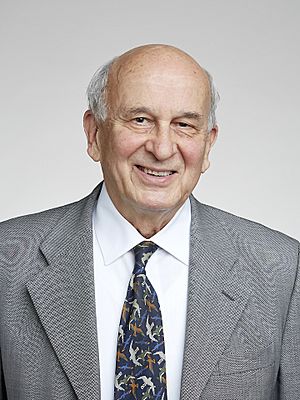Pasko Rakic facts for kids
Quick facts for kids
Pasko Rakic
|
|
|---|---|

Rakic in 2016
|
|
| Born | May 15, 1933 |
| Nationality | American |
| Alma mater |
|
| Awards | Kavli Prize (2008) |
| Scientific career | |
| Fields | Neuroscience |
| Institutions | Yale University |
Pasko Rakic is a famous American neuroscientist. He was born in Yugoslavia on May 15, 1933. He works at the Yale School of Medicine in New Haven, Connecticut.
Dr. Rakic studies how the human brain grows and changes over time. He is known for discovering how the cerebral cortex develops. This part of the brain is very important for thinking and learning. In 2008, he won the first-ever Kavli Prize in Neuroscience. He still leads a research lab today.
Contents
Early Life and Education
Pasko Rakic was born in a town called Ruma in what was then Kingdom of Yugoslavia. His father, Toma Rakić, was from Croatia. His mother, Juliana Todorić, had Serbian and Slovakian family. She was born in Dubrovnik.
Because his father worked for the tax services, the family moved often. Pasko and his sister, Vera, finished high school in Sremska Mitrovica. Vera became a mathematician. Pasko studied medicine at the University of Belgrade School of Medicine. He first planned to become a brain surgeon.
In 1962, he received a special scholarship to study at Harvard University in Boston. There, he met Professor Paul Yakovlev. Professor Yakovlev showed him how exciting it was to study how the human brain develops. This made Rakic decide to focus on research instead of surgery.
He returned to Belgrade and earned a degree in Developmental Biology and Genetics in 1969. During his studies, he made his first big discovery about the brain. After that, he worked and taught at Harvard Medical School for eight years.
Later Career and Leadership
In 1978, Dr. Rakic joined Yale University. He started the Department of Neurobiology there and was its first leader. He also became the director of the Kavli Institute for Neuroscience. From 1995 to 1996, he was the president of the Society for Neuroscience. This is a big group for brain scientists.
Since 2015, he has focused full-time on his research projects. These projects get money from the US government and other groups.
Discoveries About the Brain
Dr. Rakic is famous for his work on how the brain develops and changes. He found out how new brain cells (neurons) are made and how they move to their correct places in the cerebral cortex. The cerebral cortex is the outer layer of the brain. It helps us think, learn, and use our unique human abilities.
One of his important experiments involved using a special radioactive marker. He used it to trace how brain cells were created and moved in monkeys. This helped him understand how different parts of the brain form. He and his team carefully studied thousands of brain sections.
This research helped prove a very important idea in neuroscience. It showed that the neurons in the cerebral cortex last for your whole life. They are not easily replaced. This means the brain cells you have are very precious!
Dr. Rakic also developed two important ideas: the "radial unit hypothesis" and the "protomap" hypothesis. These ideas help us understand how the human brain develops normally. They also help us understand what happens when development goes wrong.
He also showed that brain connections can compete with each other before birth. This competition helps shape the brain's wiring.
Awards and Recognition
Dr. Rakic has received many important awards for his work. Some of them include:
- Grass Foundation Award (1985)
- Karl Spencer Lashley Award (1986)
- Fyssen International Science Prize (1992)
- Bristol-Myers Squibb Award (2002)
- Gerard Prize (2002)
- Inaugural Kavli Neuroscience Prize (2008) – He shared this first-ever prize.
- Krieg Lifetime Achievement Award (2010)
- Max Cowan Award (2013)
- Sandy Palay Award (2014)
- Child Mind Institute Award (2014)
- Becker Award (2014)
- Royal Academy of Medicine (Spain) (2018)
- Royal Academy of London (UK) (2018)
Personal Life
Pasko Rakic is married to Sandra Biller. He was previously married to Patricia Goldman-Rakic. She was also a very important neuroscientist. She passed away on July 31, 2003.
 | Percy Lavon Julian |
 | Katherine Johnson |
 | George Washington Carver |
 | Annie Easley |

